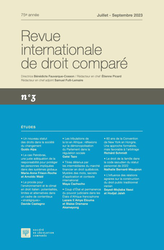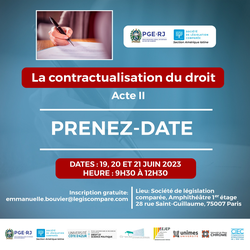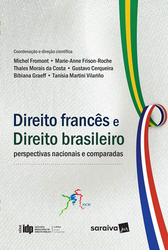Sept. 7, 2023
Publications

🌐follow Marie-Anne Frison-Roche on LinkedIn
🌐subscribe to the Newsletter MAFR Regulation, Compliance, Law
____
► Full Reference: M.-A. Frison-Roche & Arnoldo Wald, "Le cas Petrobras, une juste adéquation de la responsabilité pour protéger les personnes impliquées dans des systèmes globaux" ("The Petrobras case: the right balance of responsibility to protect those involved in global systems"), RIDC, July-September 2023, No. 3, pp. 563-582.
____
► Summary of the article: This article briefly outlines the main aspects of corporate liability in the capital market under Brazilian law, arising from the company’s duty to inform shareholders and investors, followed by a commentary on the recent partial award in an arbitration brought by minority shareholders against Petrobras, which underlines the legitimacy of the minority shareholders to engage the company’s liability.
________
June 21, 2023
Conferences

♾️follow Marie-Anne Frison-Roche on LinkedIn
♾️subscribe to the Newsletter MAFR Regulation, Compliance, Law
____
► Full Reference: M.-A. Frison-Roche, "Favoriser ou pas la « contractualisation » du Droit" ("To favour or not the "contractualisation" of the Law"), final speech in Société de législation comparée (SLC) and Procuradoria Geral do Estado do Rio de Janeiro (PGE-RJ), La contractualisation du droit. Acte II, Paris, 21 June 2023.
____
🧮See the full programme of this event (in French).
The conference is held in French
________

Updated: Sept. 24, 2019 (Initial publication: Aug. 31, 2019)
Publications

Summary : In August 2019, about the fire devastating the Amazon, the French Minister of Ecology says that this fact "is not just the business of a state" (n'est pas que l'affaire d'un Etat). This assertion denies the postulates of Public International Iaw (I). This supposes a new system, based on the idea that the power of the State on its territory is erased when the object that is there is no longer related to this "part" but to the All that is Universe (II). Let's accept the augur. First question: if it is not only the case of a State, whose business is it? (III). Second question: to anticipate the other cases that fall under this regime, what should be the criteria in the name of which the All will have to prevail over the part and who will then take care of the case of which the "local" State is divested? (IV). Because the perspective goes beyond the environment, beyond Brazil, beyond the States. It leads to Compliance Law animated by "monumental goals" that are the concern for the Universe and humans, in a humanist spirit. Let's go.
___
On August 27, 2019, on the French radio France Inter, Elisabeth Borne, French Minister of Ecology (Transition écologique) expresses it clearly: "Quand on est sur un enjeu tel que l'Amazonie, ça n'est pas que l'affaire d'un État", that can be translated : "When we are on a stake such as the Amazon, it is not only the business of one State ".
Starting from one case, "the Amazon", the Minister, thus taking up the position of the French President, associates a general consequence: "it is not only the affair of one State".
This is not a trivial sentence.
This affirmation denies, and why not, the entire system of Public International Law (I). By a new reasoning based on the idea that the All prevails, as by an effect of nature, on the Part (II).
Admitting this, it leads to opening two sets of questions. The first is related to the following main question: if it is not only the case of one State, of which is this the concern (III)? The second set of questions revolves around the questioning of the criteria on behalf of which other cases must be seized in the name of "All " and how to do it (IV).
A. The postulate of Public (and Private) International Law: parties (States) which, because of common interests, are in contact
The notion of State includes in its very definition the notion of territory (a territory, a population, institutions).
Thus the State governs through its institutions what is happening on its territory. For example, if there is a fire, or a risk of fire, the State makes arrangements through all legal, financial, technical and human instruments available to it. It is accountable for what it does through its political and legal responsibility.
When what is happening on its territory exceeds this one, in fact (epidemic, catastrophe with the consequences exceeding the borders, migrations, etc.) either according to its own opinion or according to that of the other States, the States, being sovereign subjects of Law in the international system, act together on a pre-built legal basis: bilateral or/and multilateral treaties!footnote-1675, having created legal integrated zones (like the European Union or the United States) or international institutions (like the IMF).
A particular technique has been developed for several millennia - but here again the seniority is not sufficient to keep the system: diplomacy, anchored in each state in a particular ministry: the Ministry of Foreign Affairs, which each national government has. If one State totally excludes one phenomenon in the territory of another, the progressive procedure of ceasing diplomatic ties begins.
This can result in wars.
In the "case of the Amazon" both the President of Brazil and the President of the United States stick to the classical construction of Law.
Indeed, the former asserted that the Amazon is in the territory of Brazil, thus falls under the jurisdiction of the power of the Brazilian State and the Brazilian Law, from which it follows that another State does not have to come to interfere. However, the French President takes the floor not as this forest extends also on a French territory but as it is the business of the World. On the contrary, the President of Brazil claims the closing effect, which excludes a third State from taking over directly something - even a difficulty - that takes place in the territory of another.
The President of the US federal State has said that these are joint decisions between the President of Brazil and other heads of State, sovereign subjects of Law, who must agree to organize a solution to solve a local problem . Because in the same way that States can declare war, they can help each other!footnote-1676.
The whole Public (and Private) International Law is therefore based on this assumption: "parts" of the world, on which sovereign parties (States) have taken contact, because circumstances make something that falls within one of them or several others.
This is precisely what is called into question. The notion of the "right of interference", whose evocation we hardly hear any more, had already done so. But on another basis.
B. The "right of interference": idea that somebody can directly interfere with what happens in a country , an idea that does not question the postulate of the International Maw, an idea that rests on something else: a " right for the other "
The "right of interference" is the idea that in certain territories, things happen that are inadmissible.
In memory of the jus cogens, a kind of "Natural Law" of Public International Law, Another, that could be another state, can come to meddle with what is happening in a territory that is closed, without declaring war. to the state that keeps its borders.
It is the need of others, for example those who die in mass on this territory, or the nature that is devastated in the indifference of the State on whose soil the disaster is happening, which founds this "right" of another state to come and take charge.
The foundation of this "right" is therefore a "duty".
C. The new idea: a territory is only part of the Globe, whose fate is everyone's concern
The idea is new because it is not based on altruism. And no more about self-interest. Yet, de facto and de jure , the Amazon is not on the sole territory of Brazil.
France is particularly well placed to say something about it since part of the Amazon is on French territory.
Thus the inaction of the main concerned Brazil directly affects the interest of France, a "forest" being a block that can not be divided. If we were in Property Law, we would say that we are in indivision with Brazil and that in this respect, with the other States on whose territories this forest extends, a solution must be found.
Because of the indivisibility of this particular object which is this particular fores!footnote-1644, it is necessary that the States whose territory is concerned have a say in the matter.
But this is not the argument put forward by France, particularly by the President of the Republic.
It is said that the whole world is concerned about the fate of the Amazon. It could be said that, in this respect, when what could be described as a "global forest" is well treated, its management does indeed fall within the power of Brazil, Brazilian companies and the Brazilian State, but when it is abused to the point of seeing its future compromised, when fires may make it disappear, then this forest appears not to be localized in Brazil but being located in the World, of which Brazil is only a part!footnote-1648.
This reasoning, which then gives voice to everyone, for in the world every state is included in it, is a new reasoning.
The economic-political theory of the "commons" does not account for it because it is not a very legal theory!footnote-1656.
II. THE NEW REASONING THAT COVERS THE CLASSIC REASONING OF PUBLIC INTERNATIONAL LAW
The new reasoning adopted by the Minister consists in saying that the Amazon does not concern only Brazil. This forest should therefore be directly related to the World (A). This is a welcome change in the system but based on a paradox (B).
A. When the Amazon is in danger of death, then it should no longer be attached to this part of the World that is Brazil, but directly to the World
This forest is presented as the "lung" of the planet, it is the "future" of humanity. In this, it can concern only one State, not even the one on whose territory this "Humanity good" is located!footnote-1643.
As such, without the need to declare war to Brazil, another State may speak, for example the French State through the one that represents it in the international order, that is to say its President, to say what to do, since according to him the President of Brazil does not say or do what it is absolutely necessary to do for the whole planet and for the future of Humanity.
This induces a complete renewal of international institutions.
Indeed a direct attachment to the World and no longer to Brazil gives the forest object a special status because of a goal that exceeds Brazil: save the Amazon would impose because it would save the world. Therefore, it can no longer be the subject of Brazil, which would be like "dispossessed" by a goal that is imposed on it: to save the Amazon rainforest, even though it is mainly on its territory, while other States become legitimate to dispose of this object, even if the forest would not be in part in their territory, even if they would not be affected in their own interests.
This contradicts all Public International Law!footnote-1645; because the agreement of the political representatives of Brazil is no longer required and no one yet evokes the need to declare war to Brazil, and fortunately!
Such an upheaval justifies that such an affirmation is accepted with difficulty. One understands better than first consequence, which is not so innocuous, one of the first rules of diplomacy which is the politeness, between the heads of state, with regard to the spouses of these , have be broken!footnote-1657, that the remarks have slipped on personal questions, etc.
B. A welcome but paradoxical change in the system
Why not change the system?
This is difficult to admit, not only because it is brutal, but because it is paradoxical.
The paradox is the following. It is recognized that the theme of the disappearance of borders by "globalization"!footnote-1647 no longer reproduces the reality of facts!footnote-1646, especially not the Chinese situation, the digitalization having on the contrary allowed the construction of even stronger boundaries. What we called "globalization" now belongs to the pastWhat we called "globalization" now belongs to the past!footnote-1660. So today we should recognize on one side the reality of borders - which had not disappeared or are reborn - but only to better step over them, since - based on the concern of the world - states, yet each in their borders, would be legitimate to go directly to intervene in the business of others.
The paradox is therefore, on the one hand, the rejection of the allegation of a de facto disappearance of borders by an economic interdependence, technology having denied "globalization" as a fact !footnote-1649 and the linked resurgence of borders allowing States to affirm more than ever that they would be "sovereign masters at home", which should logically lead to let Brazil decide for the Amazon, while yet on the other side we witness the questioning of the postulate of Public International Law as recognition of sovereignty and construction from agreements between states, requiring the agreement of the state whose territory is concerned (except war), questioning which leads to allow all to meddle with the fate of the Amazon, as if there was no border.
This paradox leads to two questions.
The first question is: if "it's not juste one State affair", who's concerned?
The second question is: after the "case of the Amazon", what are the other cases? And how are we going to provide solutions, if we no longer have the solutions of Public International Law, that is to say, the agreement of the country whose territory is concerned and which we do not want not go to war?
If we have clear ideas on the answers to be given to these two sets of questions, then because indeed when the future of all is in progress it can not be the affair of a single State, it is necessary to question Public International Law. But do we have clear ideas on these two questions? And what are the possibilities for possible solutions?
See the text following below.

Updated: Oct. 25, 2017 (Initial publication: May 27, 2016)
Publications

► Full Reference: Frison-Roche, M.-A., Globalization from the point of view of Law, working paper, May 2017.
____
🎤 This working paper initially served as a basis for a synthesis report made in French in the colloquium organized by the Association Henri Capitant in the International German Days on the subject of "Le Droit et la Mondialisation" (Law and Globalization).
📝 Il sert dans un second temps de base à l'article paru dans l'ouvrage La Mondialisation.
📝 it serves as a second basis for the article (written in English, with a Spanish Summary) to be published in the Brezilian journal Rarb - Revista de Arbitragem e Mediação (Revue d`Arbitrage et Médiation).
It uses the Bilingual Dictionary of the Law of Regulation and Compliance.
____
► Summary of the Working: Globalization is a confusing phenomenon for the jurist. The first thing to do is to take its measure. Once it has been taken, it is essential that we allow ourselves to think of something about it, even if we have to think about it. For example, on whether the phenomenon is new or not, which allows a second assessment of what is taking place. If, in so far as the law can and must "pretend" to defend every being, a universal claim destined to face the global field of forces, the following question - but secondary - is formulated: quid facere? Nothing ? Next to nothing ? Or regulate? Or can we still claim that the Law fulfills its primary duty, which is to protect the weak, including the forces of globalization?
____
read the Working Paper below⤵️
July 4, 2017
Thesaurus : Doctrine

Référence complète : Fromont, M., et al. (dir.), Direito francês e Direito brasileiro perspectivas nacionais e comparadas, coll. "IDP", Saraiva, 2017, 1121 p.
Lire la quatrième de couverture.
Consulter la liste des contributions à l'ouvrage.
June 28, 2012
Publications

► Référence complète : M.-A. Frison-Roche, "Le but du droit français de la concurrence, rapport français", in M. Froment, M.-A. Frison-Roche, M. da Costa, T. Vireira da Costat, G. Cerqueira, B. Graeff, T. Martini Vilarino. (dir.), Droit français et droit brésilien. Perspectives nationales et comparées, Bruylant, Bruxelles, 2012, p.833-849.
____
📘lire une présentation générale de l'ouvrage.
____
_____
► Résumé de l'article : Les prolégomènes de l'article cherchent à démontrer que malgré la proximité profonde entre le droit français et le droit brésilien, le droit de la concurrence ne présente pas forcément la même proximité. En effet, en premier lieu, du point de vue sociologique, cette branche du droit nouvelle a été en France plutôt la prolongation d'un art renouvelé d'administrer l'économie tel que les personnes formés à l'ENA peuvent le pratiquer et non pas les juristes, tandis qu'au Brésil, c'est plutôt une influence nord-américaine des milieux académiques des économistes qui se fait sentir. En outre, le droit de la concurrence est aujourd'hui à ce point intégré dans le droit de l'Union européenne que l'on hésite à parler encore de "droit français".
Ainsi, la concurrence est utilisée pour construire un "marché intérieur", unissant des pays naguère en guerre, projet étranger au brésil.
Cela dit, puisqu'il s'agit ici d'en rester au droit français, l'on peut se demander quel en est l'objet, quelles sont les marges de pouvoir de l'Autorité de concurrence, comment diminue-t-on le problème majeur de l'insécurité juridique, quelles sont les forces qui font évoluer ce droit, quelle part y prend la politique industrielle et dans quelle mesure la crise en aurait modifié les buts.
Son premier objet est la loyauté des comportements, son deuxième la garde du libre fonctionnement concurrentiel du marché, son troisième l'intérêt du consommateur, la quatrième, la construction du marché européen.
les autres finalités sont moins nettes. L'on a ainsi du mal à exprimer en quelques mots la finalité du contrôle des concentrations, la place faite à l'innovation ou le souci de la gestion des risques.
Tout ce droit repose sur l'Autorité de concurrence. Ses "marges de discrétion" tiennent non pas tant au cumul de pouvoirs qu'à la pluralité des finalités qu'elle doit satisfaire. A ce titre, elle peut rendre quasiment transparentes les autres branches du droit comme le contrat, le droit du travail ou la propriété intellectuelle. En revanche, la procédure résiste et c'est en la qualifiant de "tribunal" que les juridictions françaises l'ont obligée à a mieux respecter les garanties de procédure des entreprises mises en cause.
La sécurité juridique est apparue récemment comme un thème autonome dans le droit français. Ce droit très complexe essaie d'y satisfaire par la technique des lignes directrices. Dans cette branche du droit, la soft law est ainsi reine, côtoyant un droit des sanctions (hard law) de plus en plus sévère.
Si l'on cherche à trouver dans le droit français de la concurrence des "origines de changement", l'on pourrait dire que c'est avant tout l'Europe, par le Traité de Rome, par des arrêts fondamentaux de la Cour de Justice, comme par l'arrêt Costa, qui a mis le droit de la concurrence au centre du droit économique. Puis, l'ordonnance du 1er décembre 1986 a été un tournant majeur car sans contrainte, le Gouvernement français a choisi d'opter par principe pour le système de liberté des prix, donc le système de marché.
La question de l'articulation entre concurrence et politique industrielle demeure complexe car ne pas considérer la politique industrielle dans une économie et ne faire prévaloir que la concurrence déséquilibre l'organisation de l'économie, mais confier à l'Autorité de concurrence les deux perspectives, sous prétexte d'une "politique de la concurrence", lui offre un excessif pouvoir discrétionnaire.
Enfin, la crise économique a remis en cause le droit de la concurrence car celui-ci n'a pas pour but, voir n'a pas les moyens de contribuer à y faire face, voire à la prévenir. C'est pourquoi pour l'instant, à l'échelle européenne, la Commission européenne procède par voie d'exemption, notamment pour permettre aux États de mettre en place des plans de sauvetage de leur secteur bancaire. Il demeure qu'en la matière, le droit de la concurrence doit laisser place au droit de la régulation.
June 18, 2012
Publications

► Référence complète : M. Froment, M.-A. Frison-Roche, M. da Costa, T. Vireira da Costat, G. Cerqueira, B. Graeff, T. Martini Vilarino. (dir.), Droit français et droit brésilien. Perspectives nationales et comparées, Bruylant, Bruxelles, 2012, 1.088 p.
_____
Lire la quatrième de couverture.
_________
May 26, 2009
Conferences


Dec. 6, 2005
Teachings : Participation à des jurys de thèses
June 24, 2004
Conferences
Sept. 12, 2003
Conferences